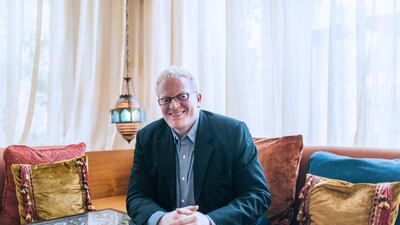Spending on scientific research in the Arab world is woefully low – but there's one much cheaper way to spark innovation: let our children misbehave. That's the view of Nader Sabry, a space technology entrepreneur based between the UAE and his native Canada, who believes fostering innovation can start from simply allowing your children to express themselves freely. The 37-year -old, who created the world's first "physiological prayer mat", says the relatively low amount of money being spent on research and development in the Arab world is "alarming". Now, the entrepreneur, whose company TimeZ5 has sold tens of thousands of the prayer mat, which is certified by the US Space Foundation and employs antimicrobial technology first used in Nasa astronaut suits, has launched a non-profit Get2Space initiative to inspire people in the region about the final frontier.
What’s the aim of the Get2Space initiative?
To bring hope and prosperity to underdeveloped or developing nations in the form of science and technology. The core of this whole space industry is built around one thing, which is hope. We launched the Get2Space.com website, which had a lot of research around how the Arab and Muslim world has actually had a lot of impact on the space industry, something many people are not aware about. We sponsored somebody from the region, who [is set] to be the first Egyptian astronaut to go to space.
The UAE plans to send an unmanned probe – dubbed, appropriately, Hope – to Mars. Do you see any spin-off technologies from it being used on the ground?
The fact the UAE is attempting to get to Mars is an amazing message. It’s actually more important as a regional message rather than just for the UAE alone. And it gives a lot of people hope that somebody in the region is doing this, that they have great ambitions. To think about spin-offs is a bit premature right now. I think the objective is to think about actually how to get there, and to actually achieve it. And then step back. If you look at history that’s how Nasa has done it. There’s an enormous amount of space technology that is involved in our daily lives that you have no idea had originated from space.
According to the MIT Technology Review, the Arab states spend an average of 0.3 per cent of their GDP on research and development, compared to the world average of 2.1 per cent. Does that need to change?
Yes – definitely. And there’s so much more than just research and development spend. There needs to be a complete rethink. In the UAE specifically, the costs are too high. The cost of starting a business in the UAE is so high that no innovator has enough money to go spend on actually innovating. They have to spend money on setting up a licence and getting a piece of real estate, and then a whole bunch of hidden government fees. There’s not much more you can do. You’re broke. There’s a whole bunch of things that need to be completely reset before you can see a turnaround.
How else do we need to need to rethink this?
A great example is from something that happened in my own home. When my son was much younger he used to bang pots and draw on the wall. My wife would just stop him and say: “this is wrong” and he would stop. And I said: “you know what, you need to let children do some of this because they’re actually exploring their genius”. If you don’t allow simple things like that to take place, he’s not going to become a future innovator. You’d be surprised how much impact something like that would have, versus going and spending 70 times more on research and development, and coming up with a whole bunch of fancy academic papers that won’t really convert into anything.
Is there any hope of another golden era of Arab science – and what do we need to happen to get there?
The box has been checked – it is possible. You’ve done it before, and you can do it again. So where’s the hold-up? Let’s get to it. Let’s start to develop cultural elements that allow people to take more risk. The more risk-taking they are, the more likely they are to come up with new ideas.
Is TimeZ5 looking at any other products or services after the physiological prayer mat?
We have several products that we’re developing now that are in R&D. The average research and development cycle is between two to three years to develop a breakthrough product. So it’s not as fast and simple as we’d all like it to be.
business@thenational.ae
Follow The National's Business section on Twitter

